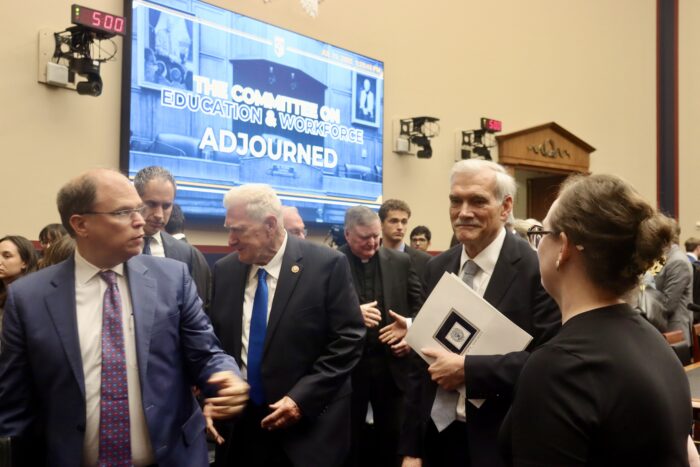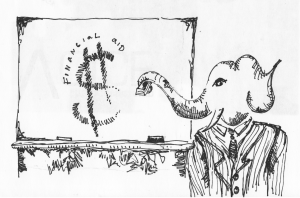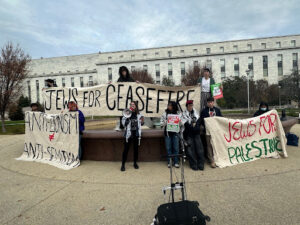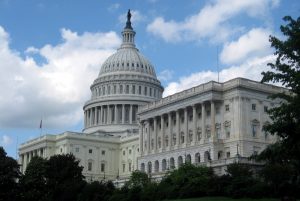On July 15, Georgetown Interim President Robert M. Groves testified before the House Committee on Education and the Workforce in a hearing titled, “Antisemitism in Higher Education: Examining the Role of Faculty, Funding, and Ideology.” In the three-hour hearing, Groves was questioned by multiple House representatives about Georgetown’s Qatar campus, guest speakers, and faculty’s statements on social media.
Minutes before the hearing began, Groves sent a university-wide email that included a written version of his testimony and addressed Georgetown’s commitment to combating antisemitism and other forms of hate.
“The hearing focuses on antisemitism. While my written testimony necessarily focuses on Georgetown’s efforts to eliminate it from our campus, we know that our mission also deplores Islamophobia, racism, and all forms of hate,” Groves wrote in the email.
This hearing follows recent legal action and funding cuts by the Trump administration against multiple top universities. On March 7, four departments of government withdrew $400 million in federal funding to Columbia University, claiming that the university had failed to protect Jewish students from harassment. The Department of Justice put nine other universities on an official list of schools that would face government action if they did not respond to allegations of antisemitism on campus.
On June 30, the U.S. Department of Education released a letter claiming that Harvard University had violated the Civil Rights Act in its responses to alleged antisemitism on campus, which comes after months of legal battles between the Trump administration and Harvard University.
Groves explains Georgetown’s policies and definitions of antisemitism
Vice Chairman Burgess Owens (R-Utah) asked all three participating university leaders, including representatives of the University of California, Berkeley and the City University of New York (CUNY), whether they believed denying the Jewish people their rights to self-determination was considered antisemitism. Groves answered yes.
Owens also asked whether the university leaders considered celebrating violence against Jews with phrases like ‘globalize the intifada’ antisemitic. Groves replied, “As a threat, absolutely.”
At the hearing, Groves testified that Georgetown offers a diversity of perspectives to foster interfaith dialogue.
“Given our Jesuit values, we expose students to different viewpoints on the Middle East. In addition to speakers on Gaza, we hosted [Israeli Defense Force] soldiers, families of Israelis and Palestinians who have lost their lives, families of U.S. hostages in Gaza,” Groves said.
Groves also testified regarding Georgetown’s response to student conduct violations and noted that there has been no physical violence during demonstrations on campus since Oct. 7, 2023.
“On October 8, a day after the Hamas attack, Georgetown was one of the first universities to speak out. Similarly, we try to act quickly to student conduct violations,” Groves said. “Georgetown is not perfect, and as events evolve, we’ve had to clarify rules of student behavior. But since October 7, Georgetown has not experienced an encampment, physical violence, cancellation of commencement activities, or city police activities.”
While D.C. city police have not directly interacted with protestors at Georgetown, Metropolitan Police Department vehicles arrived outside the university’s front gates on April 11 after multiple Georgetown University Police Department (GUPD) officers physically removed a group of pro-Palestine protestors from Healy Hall.
Georgetown has not directly experienced an encampment, but several Georgetown students were involved in the April 2024 encampment at George Washington University, where seven Georgetown students were arrested.
Groves responds to reports of alleged antisemitism on Georgetown’s campus
In response to representatives’ questions, Groves cited several instances in which Georgetown enacted disciplinary actions against alleged antisemitic behavior. Rep. Virginia Foxx (R-N.C.) first pointed to a tweet that Georgetown Chair of Islamic Civilization Jonathan A.C. Brown published on his X page on June 22.
“I hope Iran does some symbolic strike on a base,” Brown wrote.
According to a university spokesperson, Georgetown has since removed Brown from his position as Chair of the Department of Arabic and Islamic Studies, though he retains the position of Alwaleed bin Talal Chair of Islamic Civilization in the SFS. Groves said that the university has placed him on leave awaiting further review.
Rep. Glenn Thompson (R-Pa.) also questioned Groves about whether Georgetown enforced disciplinary action against alleged antisemitic behavior on campus. Thompson cited a 2024 incident where a perpetrator placed flyers mimicking eviction notices on Jewish students’ dormitory doors. Photos of the flyers shared with the Voice indicated that they were placed on freshmen-year dorms before Fall move-in, not Jewish student dorms exclusively.
“Israel’s genocidal policies are America’s genocidal policies are Georgetown’s genocidal policies,” the flyer wrote. “This is [sic] eviction notice is not real. But how would you feel if it was?”
Groves said that Georgetown acted immediately by removing the fake eviction notices, forming an assembly of staff around the incident, and identifying and disciplining the perpetrator.
While Thompson thanked Groves for his disciplinary action in this instance, he noted that he believes Georgetown has displayed a lack of intervention in response to Georgetown-affiliated faculty’s social media posts.
“That’s not the policy of Georgetown. And I want everyone to know that to the extent that I’ve hurt these students, these faculty, these staff at Georgetown, I apologize for that,” Groves said. “But that’s behavior covered under the First Amendment on social media that we don’t intervene on. What we do intervene on is behavior that affects our students in the classroom, and social activities in the classroom.”
Representatives criticize the Qatar campus
Rep. Bob Onder (R-Mo.) questioned Groves about the founding of Georgetown’s Qatar campus, which was founded in partnership with the Qatar Foundation in 2005.
“The vision of the Qatar Foundation was to build a group of Western universities in Doha that would offer Western education to the region in a vision that Qatar would gradually become a hub for higher education and research,” Groves said.
Rep. Randy Fine (R-Ariz.) further questioned Groves about a student-led exhibition on the Qatar campus about armed resistance in Africa in solidarity with Palestine titled “Decolonization Is Not Just a Theory.”
“What does ‘Decolonization Is Not Just a Theory’ mean to you and what does it mean to Georgetown?” Fine asked.
Groves replied he was ignorant of the exhibition and specified that students led the event without administrative involvement.
Committee Chairman Rep. Tim Walberg (R-Mich.) also called for universities like Georgetown to provide more transparency about how they fund campuses abroad.
“Foreign funding can influence research priorities, faculty appointments, public statements, and events on campus,” Walberg said. “This is especially the case for U.S. universities with a separate campus abroad.”
Rep. Owens questions Georgetown for inviting guest speaker Mohammed El-Kurd
Owens criticized Georgetown for hosting a book launch for Palestinian poet and activist Mohammed El-Kurd. Owens said El-Kurd has said that “Israelis harvest organs off the market,” likely referencing an X post in which El-Kurd wrote of the Israeli military’s possible organ theft.
Groves said that he was unaware of El-Kurd or the event, but noted that Georgetown invites speakers from different perspectives. Owens argued that Georgetown’s welcoming of El-Kurd was akin to hosting speakers from the Ku Klux Klan (KKK), a white supremacist hate group, on campus.
“If Georgetown would prevent white KKK bigots on campus, why would the university allow faculty or students to invite Palestinian antisemitic bigots?” Owens asked.
Groves was not able to respond to this question as Owens’ time expired.
Four separate attendees interrupt committee session
The hearing paused four times after attendees interrupted by entering the room and shouting. Members of staff quickly removed the protestors. One of the attendees directly addressed CUNY Chancellor Félix V. Matos Rodríguez.
“Félix Matos, you have blood on your hands. How can you sit there talking about the feelings of Jewish students, when there are no universities left in Gaza?” the speaker said. “There’s blood on your hands. You are a genocidal war criminal.”
After the fourth interruption, Fine turned to the three individuals testifying, including Groves, and raised his voice.
“I hold you all responsible for this. It is the attitude that you have allowed on your college campuses that make people think that this is okay,” Fine said.
Fine asked Groves how he would ensure that Jewish students, including Fine’s son, feel safe on campus.
“I would deeply hope that he would feel safe,” Groves said. “And there’s a reason for this at Georgetown. If Jewish students don’t feel safe, if they have fear, it’s not just hurtful to them—it destroys our mission of interfaith dialogue.”
Groves’ written statement brought up Georgetown’s response to critiques made by the Anti-Defamation League (ADL), an organization confronting antisemitism.
“Georgetown has addressed some of ADL’s critiques. For example, we have explicitly rejected a BDS proposal advanced by a student referendum, explicitly prohibited antisemitism in our anti-discrimination policies, begun mandatory antisemitism education for student leaders and for all incoming students, and clarified speech and expression guidelines, to include a new provision regarding masking and face covering during protests,” Groves wrote.
Georgetown students passed a referendum earlier this year calling on the university to divest from companies connected to the Israeli military and end partnerships with Tel Aviv University and other Israeli institutions with “direct involvement in the occupation and genocide.” Minutes after the GUSA Election Commission announced the referendum results, Groves announced that the university would not implement the referendum’s demands.
Groves also wrote that Georgetown regularly liaises with the D.C. Metropolitan Police Department and the Federal Bureau of Investigation (F.B.I.) regarding threats to Georgetown and D.C. as a whole.
Rep. Scott criticizes funding cuts to universities, calling for similar attention to other forms of bigotry
Rep. Robert Scott (D-Virg.), the ranking member of the committee, criticized the committee’s silence on the Trump administration’s attacks on Diversity, Equity, and Inclusion (DEI) and education programs, noting the lack of focus on other forms of hatred and bigotry.
“Antisemitism, like all forms of hate and bigotry, must be a moral and civic priority. But I’d be remiss if I did not point out that this is our ninth hearing on antisemitism in 18 months,” Scott said. “We have not held a single hearing addressing racism, xenophobia, sexism, Islamophobia, or other challenges affecting other student groups on American college campuses.”
The Trump administration has initiated multiple funding cuts and legal action to top universities with the stated purpose of protecting Jewish students.
Faculty and community members at Georgetown, among other universities, have also faced threats of deportation after expressing pro-Palestinian beliefs. Immigration and Customs Enforcement (ICE) arrested and detained Georgetown postdoctoral fellow Dr. Badar Khan Suri on March 17. Tricia McLaughlin, assistant secretary of the Department of Homeland Security, posted two days later that Suri had spread “Hamas propaganda” online and had connections to Hamas. Khan Suri returned home on May 14 after Federal judge Patricia Tolliver Giles ordered his release.
Scott also said that the administration’s policies for DEI initiatives on college campuses contradict its stated commitment to eradicate antisemitism.
“I have witnessed this committee’s silence on the administration’s wholesale attack on diversity, equity, inclusion, and accessibility, DEI initiatives designed to make campuses more welcoming to all groups.”
Rep. Summer Lee (D-Pa.) also spoke at the hearing, calling it an opportunity to demonize Muslims and Palestinians.
“This is yet another hearing to demonize Muslims and their religion, to demonize Palestinians, including those in Gaza who have undeniably faced unspeakable harms—a humanitarian crisis, a human rights crisis—and particularly the young student activists and faculty who are determined to stand up against human rights violations,” Lee said.
 Photo by Chih-Rong Kuo
Photo by Chih-Rong Kuo
Georgetown students respond to the hearing
Georgetown University Students for Justice in Palestine (SJP) released a joint statement with National SJP, UC Berkeley SJP, CCNY SJP, and CUNY for Palestine. The statement criticized the committee, citing a report that it released on October 31 and claiming that the committee denied students free speech rights in the name of combating antisemitism.
“The evidence of the claims the Committee set forth were nothing more than a disgraceful conflation of antisemitism and anti-zionism,” the organizations wrote. “The students recognize these threats to our First Amendment Rights as nothing more than a deliberate distraction from the ongoing occupation and genocide. We condemn the manipulative weaponization of antisemitism aimed at stripping students of our constitutional rights and silencing us.”
The Georgetown Jewish Student Association did not respond immediately to the Voice’s request for comment.
Throughout the hearing, Groves emphasized Georgetown’s mission of interfaith dialogue and its commitment that students from all backgrounds are safe to practice and express their religion.
“The Church has directed the Jesuits to foster dialogue across all religions. Therefore, any hatred or fear among our students destroys that dialogue,” Groves said. “Antisemitism is incompatible with living our mission.”








great